Profiles of 2022-2023 CRS Fellows
Minea Armijo Romero
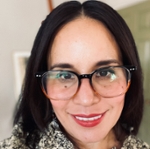 Minea Armijo Romero is a Ph.D. Candidate in Language Literacy and Sociocultural Studies at the University of New Mexico. Her dissertation looks at transnationalism, through the lens of border theory, intercultural educational models, and bilingual education in indigenous Mexican communities. Her work is situated in Santa Fe de la Laguna in the state of Michoacán, México. Armijo’s research looks at what contributes to the process of transnational education in indigenous communities. The results of this research will provide valuable information that will inform curricular practices of students coming from these bilingual programs into bilingual programs in Mexico and in the United States. Minea has been an educator in K-12 in various in New Mexico in bilingual settings and is currently faculty at Central New Mexico Community College. Armijo received a B.A. in Art and the University of Texas at El Paso, a MA in Art History from New Mexico State University, and a M.Ed. in Curriculum and Instruction in Bilingual Education from the University of Texas at El Paso.
Minea Armijo Romero is a Ph.D. Candidate in Language Literacy and Sociocultural Studies at the University of New Mexico. Her dissertation looks at transnationalism, through the lens of border theory, intercultural educational models, and bilingual education in indigenous Mexican communities. Her work is situated in Santa Fe de la Laguna in the state of Michoacán, México. Armijo’s research looks at what contributes to the process of transnational education in indigenous communities. The results of this research will provide valuable information that will inform curricular practices of students coming from these bilingual programs into bilingual programs in Mexico and in the United States. Minea has been an educator in K-12 in various in New Mexico in bilingual settings and is currently faculty at Central New Mexico Community College. Armijo received a B.A. in Art and the University of Texas at El Paso, a MA in Art History from New Mexico State University, and a M.Ed. in Curriculum and Instruction in Bilingual Education from the University of Texas at El Paso.
Joseph M. Birkmann
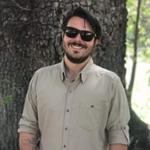 Joseph M. Birkmann is a Ph.D. candidate in the Department of Anthropology at the University of New Mexico, whose research is focused on the Preceramic history of the North American Southwest. His dissertation, “Middle Archaic Farmer-Foragers in Southeastern Arizona,” examines the adoption of Mesoamerican domesticates (maize and squash) by Indigenous hunter-gatherers in the southern Southwest during the late-Middle Archaic period, approximately 4100 - 3600 years before present. Birkmann is a lithicist, geoarchaeologist, and flint knapper who has conducted archaeological research in academic and cultural resource management contexts throughout New Mexico and Arizona. He received his M.A. in Anthropology (Archaeology) from the University of New Mexico and his B.A. in both Anthropology and Philosophy from CUNY Queens College.
Joseph M. Birkmann is a Ph.D. candidate in the Department of Anthropology at the University of New Mexico, whose research is focused on the Preceramic history of the North American Southwest. His dissertation, “Middle Archaic Farmer-Foragers in Southeastern Arizona,” examines the adoption of Mesoamerican domesticates (maize and squash) by Indigenous hunter-gatherers in the southern Southwest during the late-Middle Archaic period, approximately 4100 - 3600 years before present. Birkmann is a lithicist, geoarchaeologist, and flint knapper who has conducted archaeological research in academic and cultural resource management contexts throughout New Mexico and Arizona. He received his M.A. in Anthropology (Archaeology) from the University of New Mexico and his B.A. in both Anthropology and Philosophy from CUNY Queens College.
Larkin Chapman
 Larkin Chapman is a PhD student in the Department of Anthropology. She received her B.A. in French and Anthropology from Iowa State University and is now pursuing zooarchaeological research at UNM. Larkin is part of the first cohort of the Museum Research Traineeship, and NSF-funded program aimed at preparing graduate students for an interdisciplinary research career with museum collections. Her current research investigates the temporal overlap between humans and horses in the American Southwest at the end of the Pleistocene. For this research, Larkin is using museum specimens from multiple institutions to expand our understanding of human-horse interaction. To examine the potential for human causes behind the regional extirpation of Pleistocene horses in North America, Larkin is utilizing laboratory procedures such as radiocarbon dating and stable isotope analysis. This research will contribute to our understanding of the rich archaeological record of Paleoindian megafaunal exploitation in the Southwest.
Larkin Chapman is a PhD student in the Department of Anthropology. She received her B.A. in French and Anthropology from Iowa State University and is now pursuing zooarchaeological research at UNM. Larkin is part of the first cohort of the Museum Research Traineeship, and NSF-funded program aimed at preparing graduate students for an interdisciplinary research career with museum collections. Her current research investigates the temporal overlap between humans and horses in the American Southwest at the end of the Pleistocene. For this research, Larkin is using museum specimens from multiple institutions to expand our understanding of human-horse interaction. To examine the potential for human causes behind the regional extirpation of Pleistocene horses in North America, Larkin is utilizing laboratory procedures such as radiocarbon dating and stable isotope analysis. This research will contribute to our understanding of the rich archaeological record of Paleoindian megafaunal exploitation in the Southwest.
Mario Esteban del Ángel Guevara
 Mario Esteban del Ángel Guevara is native of Monterrey, Mexico where he obtained his bachelor's degree in Bilingual education at the “Universidad Autónoma de Nuevo León”. He is a PhD candidate in Hispanic Linguistics at the Department of Spanish and Portuguese where he has taught courses in Spanish as a Second Language, Heritage language, Medical Spanish and currently teaches bilingual courses on Curanderismo: Traditional Medicine of Mexico and the Southwest. Besides teaching, his work also includes translating and interpreting Spanish-English. Currently, he conducts linguistic research in northern New Mexico communities investigating the lexical diversity and influence between the two largest Hispanic groups in the state; the Mexican diaspora and Native New Mexicans. Visit this article from the Santa Fe Reporter for more details: Confluence of Dialects
Mario Esteban del Ángel Guevara is native of Monterrey, Mexico where he obtained his bachelor's degree in Bilingual education at the “Universidad Autónoma de Nuevo León”. He is a PhD candidate in Hispanic Linguistics at the Department of Spanish and Portuguese where he has taught courses in Spanish as a Second Language, Heritage language, Medical Spanish and currently teaches bilingual courses on Curanderismo: Traditional Medicine of Mexico and the Southwest. Besides teaching, his work also includes translating and interpreting Spanish-English. Currently, he conducts linguistic research in northern New Mexico communities investigating the lexical diversity and influence between the two largest Hispanic groups in the state; the Mexican diaspora and Native New Mexicans. Visit this article from the Santa Fe Reporter for more details: Confluence of Dialects
Lukas Denk
 Lukas Denk is a PhD candidate at the Department of Linguistics. His project is to create a Navajo Corpus based on the “Navajo historical selections” by Robert W. Young and William Morgan (1954). While there are several recorded narratives in Navajo, a digital corpus with interlinear information about the composition of words and their literal meanings is still needed. An annotated corpus facilitates empirical research related to various questions, such as: what are the most common expressions?, how do speakers refer to other participants in discourse?, what is the contextual meaning of particles like ńt’éé’, t’áá, =go? "Lukas collaborates with Professor Melvatha Chee and Jalon Begay from the Navajo Program to discuss some challenges faced in the analysis and to make the corpus easier to navigate for native speakers and/or linguists.
Lukas Denk is a PhD candidate at the Department of Linguistics. His project is to create a Navajo Corpus based on the “Navajo historical selections” by Robert W. Young and William Morgan (1954). While there are several recorded narratives in Navajo, a digital corpus with interlinear information about the composition of words and their literal meanings is still needed. An annotated corpus facilitates empirical research related to various questions, such as: what are the most common expressions?, how do speakers refer to other participants in discourse?, what is the contextual meaning of particles like ńt’éé’, t’áá, =go? "Lukas collaborates with Professor Melvatha Chee and Jalon Begay from the Navajo Program to discuss some challenges faced in the analysis and to make the corpus easier to navigate for native speakers and/or linguists.
Gustavo García
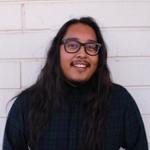 Gustavo García is a fourth year PhD student in the department of Chicana/o Studies. He received his BA in American Indian Studies and Chicana/o Studies at the University of California Los Angeles and an MA in American Studies at the University of New Mexico. His dissertation project explores the entanglements of colonialism, capitalism, and Oaxacan survivance from the 1980’s to the present. Gustavo’s analyzes the ways Oaxacan cultural producers deconstruct and subvert colonial capitalist conditions across Mexico and the United States. His project brings together an archive of Oaxacan Worldmaking expressions such as art, music, podcasts, poetry, and language. During the CRS fellowship, Gustavo will be working on a chapter of his dissertation, The Visual Poetics of Oaxacan Art: Radical Subjectivities, Transborder Histories and Oaxacan Placemaking. This chapter thinks with the poetics of Oaxacan art to examine the everyday conditions of Oaxacans living in California, particularly the experiences of indigenous, transborder, and migrant populations.
Gustavo García is a fourth year PhD student in the department of Chicana/o Studies. He received his BA in American Indian Studies and Chicana/o Studies at the University of California Los Angeles and an MA in American Studies at the University of New Mexico. His dissertation project explores the entanglements of colonialism, capitalism, and Oaxacan survivance from the 1980’s to the present. Gustavo’s analyzes the ways Oaxacan cultural producers deconstruct and subvert colonial capitalist conditions across Mexico and the United States. His project brings together an archive of Oaxacan Worldmaking expressions such as art, music, podcasts, poetry, and language. During the CRS fellowship, Gustavo will be working on a chapter of his dissertation, The Visual Poetics of Oaxacan Art: Radical Subjectivities, Transborder Histories and Oaxacan Placemaking. This chapter thinks with the poetics of Oaxacan art to examine the everyday conditions of Oaxacans living in California, particularly the experiences of indigenous, transborder, and migrant populations.
Suraj Ghimire
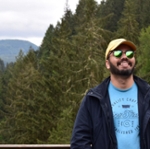 Suraj Ghimire is a doctoral candidate in the Department of Economics. He examines the environmental externalities of big dairy farms in New Mexico and their impact on public health in his dissertation, "Concentrated Animal Feeding Operations, Environmental Quality, and Public Health." In one of his dissertation chapters titled “Economic Viability of Bioenergy Production on Large Dairy Farms: An Assessment for New Mexico”, he assesses the bioenergy potential of large dairies in New Mexico and its economic viability under alternative scenarios of carbon offset prices and the social cost of carbon. He holds an MBA from Southeast Missouri State University as well as an MA in Economics from the University of New Mexico. Throughout his three years in the state, Suraj has grown in love with New Mexico and appreciates its finest features, notably the New Mexican food and outdoor experiences.
Suraj Ghimire is a doctoral candidate in the Department of Economics. He examines the environmental externalities of big dairy farms in New Mexico and their impact on public health in his dissertation, "Concentrated Animal Feeding Operations, Environmental Quality, and Public Health." In one of his dissertation chapters titled “Economic Viability of Bioenergy Production on Large Dairy Farms: An Assessment for New Mexico”, he assesses the bioenergy potential of large dairies in New Mexico and its economic viability under alternative scenarios of carbon offset prices and the social cost of carbon. He holds an MBA from Southeast Missouri State University as well as an MA in Economics from the University of New Mexico. Throughout his three years in the state, Suraj has grown in love with New Mexico and appreciates its finest features, notably the New Mexican food and outdoor experiences.
Frances Jones
 Frances Jones is a PhD candidate in the Linguistics Department, where she explores English language variation in northern New Mexico, a region with a unique sociohistorical context which makes it particularly interesting in terms of English dialectology. Her current research is focused on Española, New Mexico, a city that many New Mexicans associate with a distinctive “Nuevomexicano” English accent which is commonly perceived to be influenced by Spanish. This research provides insight into the processes underlying dialect formation and language variation, and reveals some of the ways New Mexicans’ language attitudes and language practices intersect with concepts of New Mexican identity and culture.
Frances Jones is a PhD candidate in the Linguistics Department, where she explores English language variation in northern New Mexico, a region with a unique sociohistorical context which makes it particularly interesting in terms of English dialectology. Her current research is focused on Española, New Mexico, a city that many New Mexicans associate with a distinctive “Nuevomexicano” English accent which is commonly perceived to be influenced by Spanish. This research provides insight into the processes underlying dialect formation and language variation, and reveals some of the ways New Mexicans’ language attitudes and language practices intersect with concepts of New Mexican identity and culture.
Mishelle Jurado
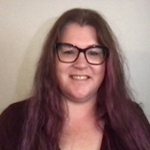 Mishelle Jurado is a PhD candidate in Language, Literacy, and Sociocultural Studies at the University of New Mexico and a high school Spanish Language Arts teacher (Spanla). Her scholarship is about bilingualism, bilingual teacher identity, US Spanish Language Arts Curriculum, Borderlands, and Visión Transfronteriza. Her dissertation research utilizes testimonio methodology to acknowledge and center the lived experiences and language practices of high school Spanla teachers in Dual Language programs. Her study is the first of its kind for US Spanla teachers. They, the teachers and researcher, theorize on what it means to be a Spanla teacher and the curriculum they create in the borderlands through their testimonios. Mishelle is currently working on her IRB to begin her data collection this fall with urban and rural Spanla teachers from New Mexico. She hopes her study will provide support for current and up incoming Spanla teachers in bilingual programs in New Mexico and the US.
Mishelle Jurado is a PhD candidate in Language, Literacy, and Sociocultural Studies at the University of New Mexico and a high school Spanish Language Arts teacher (Spanla). Her scholarship is about bilingualism, bilingual teacher identity, US Spanish Language Arts Curriculum, Borderlands, and Visión Transfronteriza. Her dissertation research utilizes testimonio methodology to acknowledge and center the lived experiences and language practices of high school Spanla teachers in Dual Language programs. Her study is the first of its kind for US Spanla teachers. They, the teachers and researcher, theorize on what it means to be a Spanla teacher and the curriculum they create in the borderlands through their testimonios. Mishelle is currently working on her IRB to begin her data collection this fall with urban and rural Spanla teachers from New Mexico. She hopes her study will provide support for current and up incoming Spanla teachers in bilingual programs in New Mexico and the US.
Edrea Mendoza Quintero
 Edrea Mendoza Quintero is a PhD candidate in the History department. Originally from outside Oakland, Calif., she received her BA from the University of Denver and spent time working for the National Park Service in Washington, D.C. before earning her MA at Louisiana State University. Her research focuses on reproductive justice and the state making process in Cold War Mexico. More specifically, she examines the progression of sex education programs, access to abortion and family planning initiatives, and ideas about maternity, to gain a better understanding of how conservative Mexican governments were forced to adapt their ideologies regarding women’s reproductive labor in the face of national and global pressures and anxieties.
Edrea Mendoza Quintero is a PhD candidate in the History department. Originally from outside Oakland, Calif., she received her BA from the University of Denver and spent time working for the National Park Service in Washington, D.C. before earning her MA at Louisiana State University. Her research focuses on reproductive justice and the state making process in Cold War Mexico. More specifically, she examines the progression of sex education programs, access to abortion and family planning initiatives, and ideas about maternity, to gain a better understanding of how conservative Mexican governments were forced to adapt their ideologies regarding women’s reproductive labor in the face of national and global pressures and anxieties.
David Player
 David Player is a Black Deaf MA student in the Department of Linguistics and working toward a graduate certificate in the race and social justice program. Originally from Shreveport, Louisiana, he was inspired by groundbreaking research showing evidence of sociolinguistic variation in Black ASL. His primary research interest is the sociolinguistics of signed languages. He's now looking to build on his knowledge to examine language variation in New Mexican ASL, carrying out unchartered research in perceptual dialectology – the study of how nonlinguists perceive variation in signed languages. Rachel Whitt, a UNM reporter, interviewed him for his current research on sign language varieties in New Mexico. Here's a link to her NM sign language article. He has a B.A in Sociology & Anthropology with a minor in Black Studies.
David Player is a Black Deaf MA student in the Department of Linguistics and working toward a graduate certificate in the race and social justice program. Originally from Shreveport, Louisiana, he was inspired by groundbreaking research showing evidence of sociolinguistic variation in Black ASL. His primary research interest is the sociolinguistics of signed languages. He's now looking to build on his knowledge to examine language variation in New Mexican ASL, carrying out unchartered research in perceptual dialectology – the study of how nonlinguists perceive variation in signed languages. Rachel Whitt, a UNM reporter, interviewed him for his current research on sign language varieties in New Mexico. Here's a link to her NM sign language article. He has a B.A in Sociology & Anthropology with a minor in Black Studies.
Annie Quintana-Eddins

Annie Quintana-Eddins is a MS student in the Department of Geography and Environmental Studies. Annie is from Las Cruces, New Mexico and has always been interested in cultural and economic exchange in the borderland region. She is currently looking at the evolution of downtown Las Cruces and the adjacent Historic Mesquite District. Using oral histories and urban renewal project plans, Annie will examine the understudied urban landscape of downtown Las Cruces, capturing insights of Hispanic place-making practices, gentrification, and economic development. Annie has a B.S. in Geography Human-Environmental Relationship and a minor in Government from New Mexico State University. Outside of academia Annie works for a youth leadership non-profit out of Las Cruces that supports educational equity policies, and she is passionate about promoting her home of southern New Mexico.
Aditi Sarkar
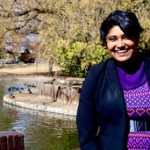 Aditi Sarkar is a Ph.D. candidate in Economics at the University of New Mexico. Her dissertation is a study of the nexus between the oil and gas (O&G) industry, the local economy, and government policies. The current project explores how the revenue from O&G production in south-east New Mexico, where part of the Permian Basin is located, has affected the state economy. Using causal inference, it analyzes how the government fiscal expenditure on public infrastructure has changed over time given the recent Permian boom. Results from this study can have policy implications in the energy transition process as we reduce our dependency on fossil fuels. The energy transition policies should be able to replace the dwindling fossil revenues. After successfully completing her internship this summer, she will join Discover Financial Services as a data scientist next year after graduation. She hopes to gain immense experience in machine learning modeling techniques.
Aditi Sarkar is a Ph.D. candidate in Economics at the University of New Mexico. Her dissertation is a study of the nexus between the oil and gas (O&G) industry, the local economy, and government policies. The current project explores how the revenue from O&G production in south-east New Mexico, where part of the Permian Basin is located, has affected the state economy. Using causal inference, it analyzes how the government fiscal expenditure on public infrastructure has changed over time given the recent Permian boom. Results from this study can have policy implications in the energy transition process as we reduce our dependency on fossil fuels. The energy transition policies should be able to replace the dwindling fossil revenues. After successfully completing her internship this summer, she will join Discover Financial Services as a data scientist next year after graduation. She hopes to gain immense experience in machine learning modeling techniques.
Thatcher Seltzer-Rogers
 Thatcher Seltzer-Rogers is a PhD candidate in the Department of Anthropology (Archaeology). He is an archaeologist who specializes in the archaeology of the prehispanic southern American Southwest/Mexican Northwest region and in the topics of culture contact and exchange, quantitative analysis, and ceramic material culture and is the author of numerous articles, book chapters, reports, and conference papers. His dissertation research analyzes changes in ceramic production and exchange, mortuary and architectural patterns, and demography at archaeological sites dating between AD 1200 and 1450 spanning both sides of the contemporary U.S.-Mexico border. He focuses specifically on identifying past patterns of culture contact as they relate to changes in sociopolitical organization in the construction and maintenance of an Indigenous borderland. He received a B.S. in Archaeological Studies from the University of Wisconsin—La Crosse and M.S. in Anthropology (Archaeology) from the University of New Mexico.
Thatcher Seltzer-Rogers is a PhD candidate in the Department of Anthropology (Archaeology). He is an archaeologist who specializes in the archaeology of the prehispanic southern American Southwest/Mexican Northwest region and in the topics of culture contact and exchange, quantitative analysis, and ceramic material culture and is the author of numerous articles, book chapters, reports, and conference papers. His dissertation research analyzes changes in ceramic production and exchange, mortuary and architectural patterns, and demography at archaeological sites dating between AD 1200 and 1450 spanning both sides of the contemporary U.S.-Mexico border. He focuses specifically on identifying past patterns of culture contact as they relate to changes in sociopolitical organization in the construction and maintenance of an Indigenous borderland. He received a B.S. in Archaeological Studies from the University of Wisconsin—La Crosse and M.S. in Anthropology (Archaeology) from the University of New Mexico.
Cassie Lynn Smith
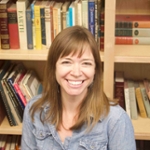 Cassie Lynn Smith is a PhD Candidate in the Department of Anthropology at the University of New Mexico (UNM). She investigates Mexican American community-based art education in Austin, Texas with a focus on communities of practice and arts education policy. Ms. Smith specializes in collaborative ethnography and applied anthropology. Her areas of interest include digital, performing, and visual arts from the US-Mexico borderlands as well as community-based archives. Ms. Smith is a Teaching Assistant for UNM’s Department of Chicana and Chicano Studies and a Teaching Artist with the Emma S. Barrientos Mexican American Cultural Center. Ms. Smith obtained a Master of Arts degree in both Latin American Studies and Art Education from The University of Texas as well as certificates in Nonprofit Studies and Mexican American Studies.
Cassie Lynn Smith is a PhD Candidate in the Department of Anthropology at the University of New Mexico (UNM). She investigates Mexican American community-based art education in Austin, Texas with a focus on communities of practice and arts education policy. Ms. Smith specializes in collaborative ethnography and applied anthropology. Her areas of interest include digital, performing, and visual arts from the US-Mexico borderlands as well as community-based archives. Ms. Smith is a Teaching Assistant for UNM’s Department of Chicana and Chicano Studies and a Teaching Artist with the Emma S. Barrientos Mexican American Cultural Center. Ms. Smith obtained a Master of Arts degree in both Latin American Studies and Art Education from The University of Texas as well as certificates in Nonprofit Studies and Mexican American Studies.
Joseph Ukockis
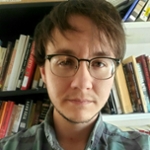 Joseph Ukockis is a PhD candidate at the University of New Mexico whose research focuses on inter-community relationships in the Mesilla Valley and surrounding areas from the late-eighteenth to mid-nineteenth centuries. His dissertation considers the endurance of Mescalero Apache sovereignty over their homelands through networks of community interdependence among themselves and other groups of people. He is also interested in deconstructing archival fictions of Indigenous criminality that have served to justify settler violence into the present day. Joseph received his BA in History at the University of Arizona and his MA in History at Northern Arizona University. He currently works as a graduate assistant at the New Mexico Historical Review and organizes with UNM United Grad Workers.
Joseph Ukockis is a PhD candidate at the University of New Mexico whose research focuses on inter-community relationships in the Mesilla Valley and surrounding areas from the late-eighteenth to mid-nineteenth centuries. His dissertation considers the endurance of Mescalero Apache sovereignty over their homelands through networks of community interdependence among themselves and other groups of people. He is also interested in deconstructing archival fictions of Indigenous criminality that have served to justify settler violence into the present day. Joseph received his BA in History at the University of Arizona and his MA in History at Northern Arizona University. He currently works as a graduate assistant at the New Mexico Historical Review and organizes with UNM United Grad Workers.
Magdalena Vázquez Dathe
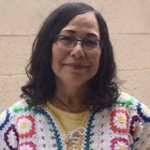 Magdalena Vázquez Dathe is a Ph.D. candidate in Educational Thought and Sociocultural Studies in the department of Language, Literacy, and Sociocultural Studies (LLSS) at the University of New Mexico (UNM). Her dissertation work focuses upon her long-term project teaching adult literacy and English as a Second Language (ESL) to Latinx immigrants in the borderlands. Through intersectionality and critical pedagogy frameworks, her research utilizes a narrative inquiry to collect the personal accounts of Latinx immigrant women learners concerning English language ownership, ESL learning experiences in their new contexts, agency as learners, and parental engagement. This research aims to contribute to critical conversations about historical and contemporary adult basic literacy teaching policies and ESL initiatives implemented in New Mexico. Magdalena received her BA in English Language Teaching from the Autonomous University of Sinaloa, Mexico, and a Master of Arts in LLSS and Teaching English to Speakers of Other Languages (TESOL) from UNM.
Magdalena Vázquez Dathe is a Ph.D. candidate in Educational Thought and Sociocultural Studies in the department of Language, Literacy, and Sociocultural Studies (LLSS) at the University of New Mexico (UNM). Her dissertation work focuses upon her long-term project teaching adult literacy and English as a Second Language (ESL) to Latinx immigrants in the borderlands. Through intersectionality and critical pedagogy frameworks, her research utilizes a narrative inquiry to collect the personal accounts of Latinx immigrant women learners concerning English language ownership, ESL learning experiences in their new contexts, agency as learners, and parental engagement. This research aims to contribute to critical conversations about historical and contemporary adult basic literacy teaching policies and ESL initiatives implemented in New Mexico. Magdalena received her BA in English Language Teaching from the Autonomous University of Sinaloa, Mexico, and a Master of Arts in LLSS and Teaching English to Speakers of Other Languages (TESOL) from UNM.
Jared Wood
 Jared Wood is a masters student in community planning and water resources at UNM. His research examines the Middle Rio Grande Conservancy District's Environmental Water Leasing Program, through which irrigators can choose to forego using their surface water rights during the summer and receive a payment instead. This allows the district to send water to strategic habitat locations as well as to help New Mexico meet its water debt to Texas. He explores the program's cultural, ecological, and economic implications to help inform conversations as policymakers are considering scaling similar programs. He hopes this research will inform public understanding and community participation in water planning decisions as we collectively navigate water scarcity in the drying West.
Jared Wood is a masters student in community planning and water resources at UNM. His research examines the Middle Rio Grande Conservancy District's Environmental Water Leasing Program, through which irrigators can choose to forego using their surface water rights during the summer and receive a payment instead. This allows the district to send water to strategic habitat locations as well as to help New Mexico meet its water debt to Texas. He explores the program's cultural, ecological, and economic implications to help inform conversations as policymakers are considering scaling similar programs. He hopes this research will inform public understanding and community participation in water planning decisions as we collectively navigate water scarcity in the drying West.
Genevieve Woodhead
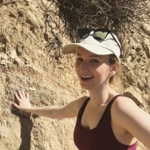 Genevieve Woodhead is a PhD candidate in the Department of Anthropology. She studies the relationships that form following migration. Genevieve will look at an example from the Ancestral Pueblo world to determine whether locals and newcomers worked together to practice pottery-making. Around AD 1100, Ancestral Pueblo people moved from the Mesa Verde area to Chaco Canyon. At this time, pottery starts to resemble what Mesa Verde potters were making. Were local Chaco potters collaborating with newcomers on this new style of pottery or were newcomers solely responsible for the change? Primary, materials-based research will help answer this question. Pueblo scholarship, including published works, artists’ statements, and interviews, contextualizes this instance of population movement. Pottery-making is a science and an art. It continues to play an important role in the Pueblo world. For these reasons, Genevieve is taking an interdisciplinary and collaborative approach to studying pottery for evidence of human interaction.
Genevieve Woodhead is a PhD candidate in the Department of Anthropology. She studies the relationships that form following migration. Genevieve will look at an example from the Ancestral Pueblo world to determine whether locals and newcomers worked together to practice pottery-making. Around AD 1100, Ancestral Pueblo people moved from the Mesa Verde area to Chaco Canyon. At this time, pottery starts to resemble what Mesa Verde potters were making. Were local Chaco potters collaborating with newcomers on this new style of pottery or were newcomers solely responsible for the change? Primary, materials-based research will help answer this question. Pueblo scholarship, including published works, artists’ statements, and interviews, contextualizes this instance of population movement. Pottery-making is a science and an art. It continues to play an important role in the Pueblo world. For these reasons, Genevieve is taking an interdisciplinary and collaborative approach to studying pottery for evidence of human interaction.
